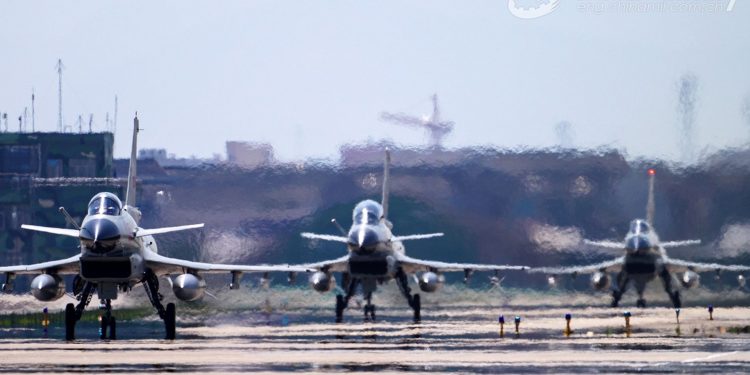China has made the second largest incursion into Taiwan’s air defence zone this year with Taipei reporting 30 jets entering the area, including more than 20 fighters.
Taiwan’s defence ministry said late Monday it had scrambled its own aircraft and deployed air defence missile systems to monitor the latest Chinese activity.
In recent years, Beijing has begun sending large sorties into Taiwan’s defence zone to signal dissatisfaction, and to keep Taipei’s ageing fighter fleet regularly stressed.
Self-ruled democratic Taiwan lives under the constant threat of invasion by China, which views the island as its territory and has vowed to one day seize it, by force if necessary.
Monday’s incursion was the largest since January 23, when 39 planes entered the air defence identification zone, or ADIZ.
The ADIZ is not the same as Taiwan’s territorial airspace but includes a far greater area that overlaps with part of China’s own air defence identification zone and even includes some of the mainland.
A flight map provided by the Taiwanese defence ministry showed the planes entering the southwestern corner of the ADIZ before looping back out again.
‘Increasingly provocative’
The United States last week accused Beijing of raising tensions over the island, with Secretary of State Antony Blinken specifically mentioning aircraft incursions as an example of “increasingly provocative rhetoric and activity”.
Blinken’s remarks came after US President Joe Biden appeared to break decades of US policy when, in response to a question on a visit to Japan, he said Washington would defend Taiwan militarily if it is attacked by China.
But the White House has since insisted its policy of “strategic ambiguity” over whether or not it would intervene has not changed.
There is growing bipartisan discussion in Washington over whether to switch to “strategic clarity” given Beijing’s increasingly aggressive approach to cross-strait relations, epitomised by the air incursions.
US senators have made multiple trips to the island in a show of support — a group led by Republican Lindsey Graham visited in April, and Democrat Tammy Duckworth landed in Taipei on Monday.
Duckworth was one of the main sponsors of the Taiwan Partnership Act, which aims to deepen security ties between Taipei and Washington. It has yet to be voted on or become law.
But after a meeting with Duckworth on Tuesday, Taiwanese President Tsai Ing-wen suggested that some form of link-up was already happening.
“As a result (of the Act), the US Department of Defence is now actively planning cooperation between the National Guard and Taiwan’s defence forces,” Tsai said in a statement, without explaining further.
Constant alert
Last year, Taiwan recorded 969 incursions by Chinese warplanes into its ADIZ, according to an AFP database — more than double the roughly 380 carried out in 2020.
The most number of aircraft China has sent in a single day was 56 on October 4, 2021.
That month saw a record 196 incursions, mostly around China’s annual national day celebrations.
So far in 2022 Taiwan has reported 465 incursions, a near 50 percent increase on the same period last year.
The sheer number of sorties has put the air force under immense pressure, and it has suffered a string of fatal accidents in recent years.
On Tuesday local media reported that a pilot had died after crashing a trainer jet in southern Kaohsiung.
It is not the first deadly crash this year — in January one of Taiwan’s most advanced fighter jets, an F-16V, plunged into the sea.
Last March, Taiwan grounded all military aircraft after a pilot was killed and another went missing when their fighters collided mid-air in the third fatal crash in less than six months.










